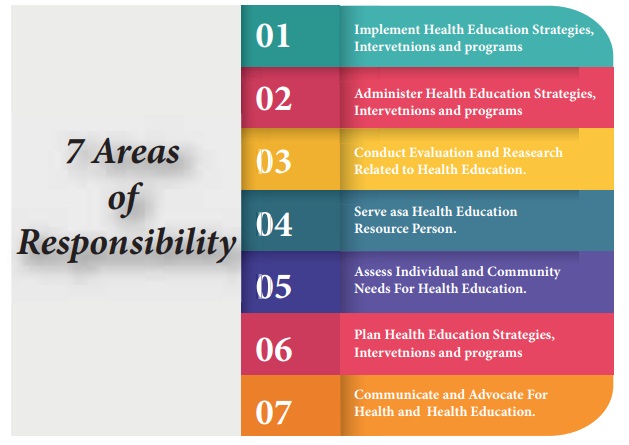Chapter: 11th Nursing : Chapter 10 : Health Education and Audio visual Aids
Role and Responsibility of health educator
Role and Responsibility of health educator
The seven areas of responsibilities which are shown below.

Responsibility I Assessin Individual and Community needs for Health education
·
Provides the foundation for program planning
·
Determines what health
problems might exist in any given groups
·
Includes determination of community resources available to
address the problem
·
Community Empowerment encourages the population to take
ownership of their health problems
·
Includes careful data collection and analysis
·
It is essential for healthy life
·
to find out the vital health statistics in community
Responsibility II lan Health education Strategies, Interventions, and Programs
·
Actions are based on the needs assessment done for the community
(see Responsibility I)
·
Involves the development of goals and objectives which are
specific and measurable
·
Interventions are developed that will meet the goals and
objectives
·
According to Rule of Sufficiency, strategies are implemented
which are sufficiently robust, effective enough, and have a reasonable chance
of meeting stated objectives
Responsibility III Implement Health education Strategies, Interventions, and Programs
·
Implementation is based on a thorough understanding of the
priority population
·
Utilize a wide range of educational methods and techniques
Responsibility I Conduct valuation
and Research Related to Health education
·
Depending on the setting, utilize tests, surveys, observations,
tracking epidemiological data, or other methods of data collection
·
Health Educators make use of research to improve their
practices.
Responsibility Administer Health education Strategies, Interventions, and
·
Administration is generally a function of the more experienced
practitioner
·
Involves facilitating cooperation among personnel, both within
and between programs
Responsibility I Serve as a Health education resource Person
·
Involves skills to access needed resources, and establish
effective consultative relationships.
Responsibility II Communicate and Advocate for Health and Health education
·
Address diverse audience in diverse settings
·
Translates scientific language into understandable information
·
Formulates and support rules, policies and legislation
·
Advocate for the profession of health education
Related Topics